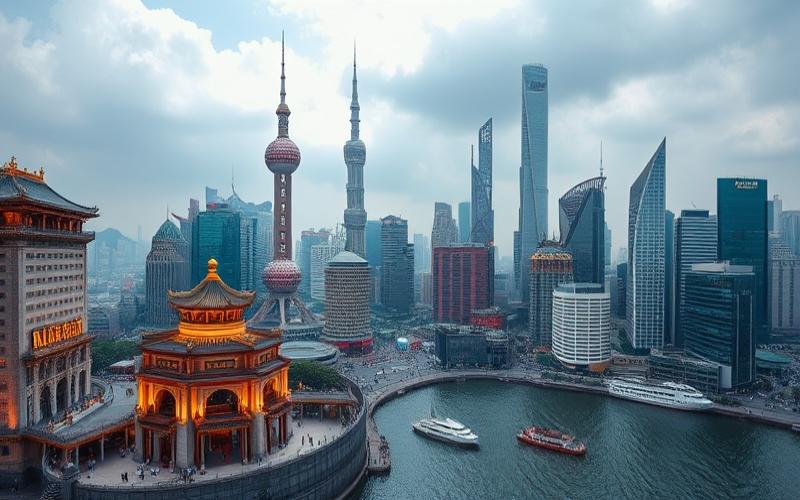
 Published on and written by Cyril Jarnias
Published on and written by Cyril Jarnias
Navigating China’s cultural mosaic as an expatriate is a fascinating adventure, but understanding the cost of living in this vibrant country is essential for settling in comfortably.
With its dynamic megacities like Beijing and Shanghai offering a blend of modern and traditional culture, China presents unique financial challenges. The differences between developed coastal cities and often more affordable inland regions highlight the need for careful budget planning.
From soaring housing prices in urban areas to the economic realities of everyday consumer goods, this guide will illuminate the daily costs you should prepare for to live peacefully in the heart of the Middle Kingdom.
Understanding the Cost of Living in China for Expatriates
The cost of living in China for expatriates varies significantly depending on the city, lifestyle, and certain external economic factors. On average, it remains considerably lower than in many Western countries (about 35 to 50% lower than in France), but significant disparities persist between major metropolitan areas and less urbanized regions.
| Expense Category | Beijing | Shanghai | Medium-sized/Rural Cities |
|---|---|---|---|
| 1-bedroom apartment downtown | ~$900–915/month | ~$915/month | ~$270/month |
⬛︎ The actual cost will always depend largely on the lifestyle adopted by the expatriate as well as their ability to adapt to local customs.
Good to Know:
The cost of living in China for expatriates varies considerably by region; major cities like Beijing and Shanghai are generally more expensive, particularly for housing, where rents can be three to four times higher than in medium-sized cities or rural areas; to reduce costs, prioritize slightly outlying housing or shared accommodations. Transportation is affordable thanks to an efficient subway network and ride-sharing apps. Local food remains cheap compared to Western standards, especially by avoiding international restaurants; cooking at home is an economical option, particularly if one adapts to local products. Private healthcare can be costly, but international health insurance can mitigate this expense. It is also crucial to monitor fluctuations in the yuan, which impact purchasing power; juggling cultural aspects, such as bargaining at the market, and remaining flexible with exchange rates can help effectively manage a daily budget.
Managing Your Expatriate Budget: Concrete Examples
Managing your expatriate budget in China requires adapting to local habits, price structures, and the digital financial environment.
Cost of Living Comparison
| Expense Category | China (major city) | France (major city) | Estimated Difference |
|---|---|---|---|
| 1-bedroom rent downtown | $515 / month | $960–1280 / month | -50% to -60% |
| Total monthly cost | $865 | $1815 | -51% |
| Simple meal | $3–5 | $13–16 | -65% |
| Monthly transportation | $28 | ~$80–96 | -60% |
Concrete Examples of Common Expenses
- Rent: From $515 for a one-bedroom apartment downtown to over $1065 for three bedrooms. Cheaper in the suburbs or small towns.
- Food:
- Local groceries: rice ($0.43/kg), eggs ($0.75/kg), chicken ($1.92/kg).
- Cheap restaurants: around $3. Average restaurant: up to ~$16.
- Imported products significantly more expensive than local products.
- Transportation:
- Subway/bus ticket: from $0.32. Monthly pass about $28.
- Taxi starting fare: ~$1.92, then additional per km (~$0.37/km).
- Shared bikes very common and economical (~$0.21 per short trip).
- Healthcare:
- Private international clinic consultation: often between $32 and over $106, depending on specialty. Insurance strongly recommended as the public system is poorly suited for non-Mandarin speaking expatriates.
- Entertainment:
- Local cinema: ~$5
- Meals in international restaurants or clubbing outings much more expensive.
Practical Tips for Managing Your Daily Budget
- Use local mobile apps like Alipay or WeChat Pay to track your expenses and take advantage of special offers (cashback, coupons…).
- Sign up for loyalty programs at Chinese supermarkets or international chains present locally.
- Prioritize local markets over international supermarkets to save on daily food expenses.
- Join expatriate groups on WeChat/QQ/Facebook where tips for temporary housing/shared accommodations/bulk purchasing circulate.
Concrete Saving Strategies
- Regularly compare the Euro/Yuan rate before any major bank transfer; prioritize Wise/Revolut/HSBC Expat depending on the transfer volume.
- Always negotiate the rent, especially for long-term commitments (>6 months).
Recommended Apps
- Alipay & WeChat Pay – contactless payment everywhere
- Meituan & Dianping – restaurant/delivery promotions
- Didi Chuxing – taxi with integrated coupons
- Xiaohongshu/Little Red Book – sharing experiences/tips among expatriates
Common Mistakes to Avoid
- Underestimating the actual cost of housing in major international Chinese metropolises like Shanghai/Beijing/Shenzhen where demand is very high in certain neighborhoods sought by expatriates.
- Systematically buying imported products when there is often a much cheaper local equivalent.
- Forgetting essential private health insurance in case of a serious accident or long-term hospitalization.
Illustrative Testimonials
“I saved nearly half of my initial food budget simply by switching to the local market after a few weeks… Mobile apps have become my best allies for spotting restaurant deals and cashback!” (Marie C., French teacher in Chengdu)
“After joining a French-speaking WeChat group dedicated to expats in my city, I found a well-located shared accommodation almost twice as cheap as what was offered through traditional agencies.” (Lucas G., telecom engineer Shanghai)
Managing your budget in China relies on flexibility in the face of cultural and technological differences — anticipating your essential needs through active monitoring via digital communities often helps avoid financial surprises while fully enjoying the local lifestyle.
Good to Know:
Living in China as an expatriate requires clever budget management, as the cost of living can vary considerably compared to international and local standards. For example, rent in a city like Shanghai can represent a significant portion of your budget, while public transportation and street food remain affordable. To save money, prioritize financial management apps like WeChat Pay and Alipay, which offer loyalty programs. Avoid common mistakes like forgetting to check rental contracts in Chinese and join expatriate networks to benefit from local deals. Expatriates testify that cooking at home and making local friends to discover economical tips are effective strategies. By managing your budget well, you can fully enjoy the unique experience of living in China.
Comparing China: A Price Overview Relative to Other Destinations
| Category | China | United States | United Kingdom | Australia | France |
|---|---|---|---|---|---|
| Housing | Much cheaper: monthly rent for a 2-bedroom apartment downtown in a major city (Shanghai, Beijing) ranges between $530 and $1065, often half that in secondary cities. | New York, San Francisco: $2665 to $4265 for a 2-bedroom downtown. Other major cities: $1600 to $2665. | London: $2130 to $3200 for a 2-bedroom downtown. Secondary cities: $1280 to $1920. | Sydney, Melbourne: $1920 to $2665 for a 2-bedroom downtown. | Paris: $1705 to $2665 for a 2-bedroom downtown. Other regions: $850 to $1280. |
| Food | Standard restaurant meal: $3 to $6. Monthly groceries for one person: $106 to $192. | Standard restaurant meal: $16 to $27. Monthly groceries: $320 to $480. | Standard meal: $16 to $27. Monthly groceries: $266 to $426. | Standard meal: $13 to $21. Monthly groceries: $266 to $373. | Standard meal: $14 to $27. Monthly groceries: $213 to $373. |
| Transportation | Subway: $0.53 to $0.85 per ticket. Gasoline: $0.85/L (approx. $0.78/L). | Subway: $2 to $3 per ticket. Gasoline: $0.83/L (approx. $0.76/L). | Subway: $2.66 to $3.73. Gasoline: $1.81/L (approx. $1.66/L). | Subway: $2 to $3. Gasoline: $1.19/L (approx. $1.09/L). | Subway: $2.02 to $2.24. Gasoline: $1.90/L. |
| Entertainment | Cinema: $5 to $7. Gym: $27 to $43/month. | Cinema: $13 to $19. Gym: $43 to $85/month. | Cinema: $13 to $19. Gym: $43 to $64/month. | Cinema: $13 to $16. Gym: $43 to $75/month. | Cinema: $11 to $15. Gym: $32 to $53/month. |
| Electricity | $0.086 / kWh (very low) | $0.191 / kWh | $0.44 / kWh (2025) | $0.22 / kWh | $0.208 / kWh |
Factors Explaining Price Differences:
- Standard of living and salaries: Average salaries are much higher in the West, leading to higher prices, especially for housing and services.
- Local availability and production: China mass-produces its everyday consumer goods (food, clothing, electronics), which reduces costs for the consumer.
- Real estate market structure: In China, the housing supply is abundant in many cities, limiting rent surges outside hyper-centers. Conversely, London, New York, or Paris experience strong real estate pressure.
- Subsidies and taxes: Certain sectors (energy, transportation) benefit from public subsidies in China, making some services significantly cheaper than in the West.
- Consumption habits: Entertainment and outings remain more affordable in China, as the average purchasing power of locals is lower and the supply adapts to this reality.
Expatriate Testimonials and Anecdotes:
“In Shanghai, I pay a third of the price of my former rent in Paris for an apartment twice as big. Taxis cost so little that I hardly use my car anymore.”
“The cost of eating out is unbeatable, but imported products (cheeses, wines, Western cereals) remain expensive, sometimes more than in Europe.”
“If major Chinese cities are becoming more expensive year by year, they remain much more affordable than London or Sydney, especially for housing and entertainment.”
Visual Summary of Average Monthly Cost Differences for a Single Person (excluding rent):
| Destination | Monthly Expenses (excluding rent) |
|---|---|
| China | $373 to $640 |
| United States | $960 to $1280 |
| United Kingdom | $850 to $1170 |
| Australia | $850 to $1065 |
| France | $745 to $1065 |
China remains one of the most affordable expatriation destinations for daily expenses, particularly excluding imported products and in major secondary cities.
Good to Know:
In China, the cost of living for an expatriate can be particularly advantageous compared to countries like the United States, United Kingdom, Australia, and France. The price of rent in cities like Beijing and Shanghai generally remains lower than in New York or London, often offering more affordable housing options. For example, a one-bedroom apartment downtown costs about 4,600 RMB ($620), compared to $1,600 in New York. However, the prices of some imported products and entertainment can be higher in China. The cost of public transportation, very efficient, is significantly lower with an average subway ticket costing 3 RMB ($0.40). For food, local markets offer fresh products at attractive prices, although dining out in international restaurants can be costly. These differences are explained by economic disparities and a local standard of living that impacts the availability of goods and services. Expatriates report that living in a major Chinese city involves adapting to price variations and being flexible, while enjoying a satisfactory quality of life thanks to reduced costs in essential categories.
Disclaimer: The information provided on this website is for informational purposes only and does not constitute financial, legal, or professional advice. We encourage you to consult qualified experts before making any investment, real estate, or expatriation decisions. Although we strive to maintain up-to-date and accurate information, we do not guarantee the completeness, accuracy, or timeliness of the proposed content. As investment and expatriation involve risks, we disclaim any liability for potential losses or damages arising from the use of this site. Your use of this site confirms your acceptance of these terms and your understanding of the associated risks.

























































